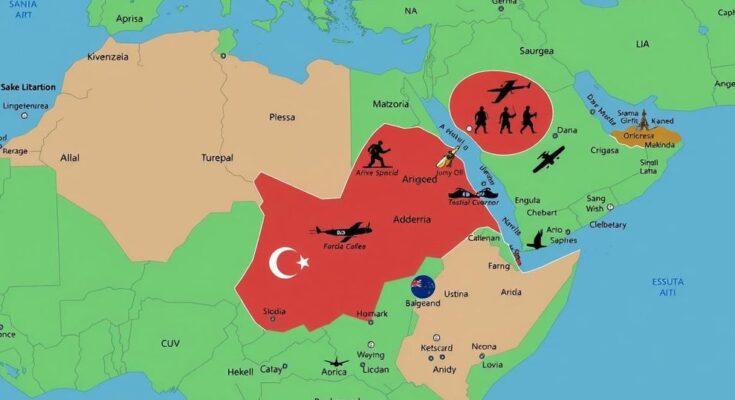Turkey aims to exploit France’s military withdrawal from Africa to expand its influence. As France reduces its presence, Turkey strengthens its military and diplomatic ties in the region, capitalizing on anti-French sentiments and providing affordable arms. However, Turkey must navigate potential overstretch in resources amid global competition and domestic economic challenges.
Turkey seeks to capitalize on France’s military withdrawal from West and Sahel Africa, as experts have observed. France’s recent reduction in its army presence, including vacating its base in Côte d’Ivoire and withdrawing from Chad, is creating opportunities for Turkey. Federico Donelli from Trieste University notes this period as transformational, stating, “Many traditional players like France are downgrading their own engagement in Africa due to local states’ preferences for their departure.”
Increased Turkish presence in Africa has been orchestrated by President Recep Tayyip Erdogan, who has notably expanded Turkey’s diplomatic missions across the continent in the past two decades. Donelli emphasizes that Erdogan leverages Turkey’s Muslim identity and the historical context of France’s colonial past to foster relations, stating, “The door is now open to new players, such as Turkey.”
Turkey’s ascent in the region has been facilitated by France’s inability to effectively manage security challenges, according to Elem Tepecikoglu of Ankara’s Social Sciences University. He remarks, “The image of France is in tatters” as local governments criticize its detrimental impact on their security. Influenced by prevailing anti-French sentiments and strategic defense agreements, Turkey has reportedly deployed military advisers and drones in Chad, an indication of its growing influence in Sahelian countries.
In recent discussions in Istanbul, Turkey and Senegal have strengthened their military cooperation, notably in the wake of Senegal’s call for the withdrawal of French troops. Turkey’s competitive arms industry offers affordable, quality military equipment, securing contracts with nations in the Sahel. Tepecikoglu mentions, “Turkish defense products are now very popular in African markets,” as countries like Nigeria and Mali have acquired Turkish military resources.
Despite being dwarfed by powers such as Russia and the United States, Turkey’s involvement in Africa may benefit from the increased rivalry among global entities. Donelli indicates that for African nations, engaging with Turkey is politically favorable compared to relations with Russia, providing a balanced approach while maintaining ties with NATO.
Nevertheless, Turkey’s rapid expansion in Africa raises concerns about overstretching its capabilities. Huseyin Bagci from Ankara Middle East Technical University notes the limits of Turkey’s military and economic resources, highlighting, “The more you expand, the more you have to pay.” Given Turkey’s economic challenges and Erdogan’s need for improved relations with Europe, analysts suggest that a strategy of cooperation may be preferable for Turkey moving forward in Africa.
In conclusion, Turkey is poised to take advantage of France’s military withdrawal from Africa, signaling a potential shift in influence within the region. The strategic positioning through arms sales and military presence amidst rising anti-French sentiment presents opportunities for Turkey. However, as the nation expands its footprint, concerns regarding overstretch in terms of resources and economic viability loom large, necessitating a careful approach to its ambitions in Africa.
Original Source: www.rfi.fr




